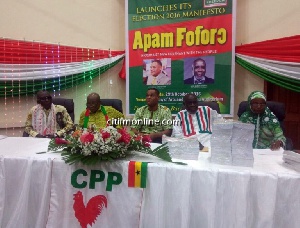The presidential candidate of the Convention People’s Party (CPP) has threatened that governance under his watch will see the repeal of the Petroleum and Exploration Law.
Addressing party supporters and sympathizers at the manifesto launch of the cockerel family at the Ghana Academy of Arts and Science in Accra on Saturday, Mr. Greestreet said his party will introduce a new law that will be more beneficial to Ghana than what it is currently earning from its oil and gas resource.
The CPP leader believes that the adoption of Ghana Hybrid System for the exploration of the country’s oil and gas resource was a plot by officials of the governing National Democratic Congress (NDC) and the biggest opposition party, the New Patriotic Party (NPP) to “steal” the country’s oil revenue.
“Senior Kwasi Pratt Jnr. made an important statement about our resources. How is it possible that we have a National Development Planning Commission goes around the whole country seeking the views of Ghanaians and Ghanaians tell this very Commission that what they want is for us to earn more from our resources that God has bequeath on our great nation – oil, gold, timber, gas, fertile lands, strong human base, access to water resources – yet we continue to wallop in abject poverty bowing before forces.
And so secretly ignoring this cardinal principle for the people of Ghana has requested – NDC and NPP went to secretly pass this Petroleum Law in stealing and emphasizing a method called the Ghana Hybrid System which is a form of getting revenue from the oil sector through royalties and taxes. And you know how bad as a nation we are at collecting taxes and you know how good multinationals are, at escaping taxes.
We will repeal that law. We will review that law. We will bring what is called the Production Sharing formula. That is where like a farmer who owes a piece of land and somebody comes to grow corn on that land, they share in the proceeds,” he noted.
According to him, between 2010 and 2015, Ghana under the hybrid system has earned US$3billion as revenue from its oil and gas sector but stressed that if the country had adopted the Production Sharing formula, the country could have earned US$10billion, thus, US$6billion more than what it has accrued over the stipulated period.
Kirsten Bindemann in his economic analysis for Oxford Institute for Energy Studies (1999) explained Production Sharing Agreements as a type of contractual arrangement in the petroleum exploration and development where the State as the owner of mineral resources engages a foreign oil company as a contractor to provide technical and financial services for exploration and development operations.
The State is traditionally represented by the government or one of its agencies such as the national oil company. The foreign oil company acquires an entitlement to a stipulated share of the oil produced as a reward for the risk taken and services rendered.
The State, however, remains the owner of the petroleum produced subject only to the contractor’s entitlement to its share of production. The government or its national oil company usually has the option to participate in different aspects of the exploration and development process. In addition, Production Sharing Agreements frequently provide for the establishment of a joint committee where both parties are represented and which monitors the operations.
General News of Saturday, 29 October 2016
Source: kasapafmonline.com

















